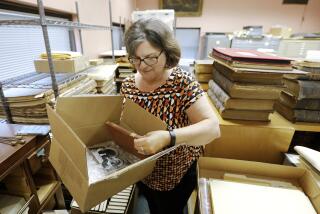Antiquarian Librarians
Forget “quiet, please.” Bibliophily is serious business at UCLA’s William Andrews Clark Memorial Library. Celebrating its 75th anniversary year, this gated haven for rare books and manuscripts occupies a square block in L.A.’s West Adams district, and one tours the elegant rooms of the European baroque-style main building by appointment. Most volumes are under lock and key, with pillows and “book snakes” on hand to protect bindings when books are being read. “Use of pen and ink is prohibited,” reads a sign atop the old wooden card catalog.
Behind the rarefied trappings, however, is a public-friendly resource doubling as one of literary L.A.’s hidden gems. The facility was built during the 1920s by book collector and philanthropist William Andrews Clark Jr., who later donated the property to UCLA. All are welcome at the Clark, where head librarian Bruce Whiteman encourages guests to “brown bag it in the lounge.” The library also hosts chamber music, lectures and other events.
The Clark boasts a 17th and 18th century collection that includes a rare copy of Edgar Allan Poe’s first book, “Tamerlane,” printed in 1827; Isaac Newton’s “Principia,” from 1687; and the first collection of Shakespeare’s plays, published in 1623 and valued at $2.2 million.
But the crown jewels may be the Clark’s Oscar Wilde material. By 1928, Clark had accumulated perhaps the world’s most significant Wilde collection. Along with scribbled notebooks and first editions, the trove includes letters, forgeries of Wilde’s work and documents from his infamous trials for defamation and “gross indecency” with young gentlemen.
The anniversary festivities kicked off last month with a celebrity reading of Wilde’s “Lady Windemere’s Fan” and continue with a display (through the end of December) of Clark’s choicest acquisitions. The main collection is worth a look as well. There’s the inscribed first edition from Wilde to Lord Alfred Douglas, the young blueblood who got him into all that hot water. Or if trouble isn’t your business, there’s the collection’s oldest title, Cicero’s “De Finibus,” published in Venice in 1471, which isn’t without relevance for our own era. As Whiteman points out, “It’s a book about morals.”
More to Read
Sign up for our Book Club newsletter
Get the latest news, events and more from the Los Angeles Times Book Club, and help us get L.A. reading and talking.
You may occasionally receive promotional content from the Los Angeles Times.







